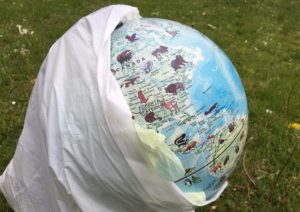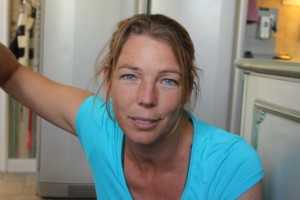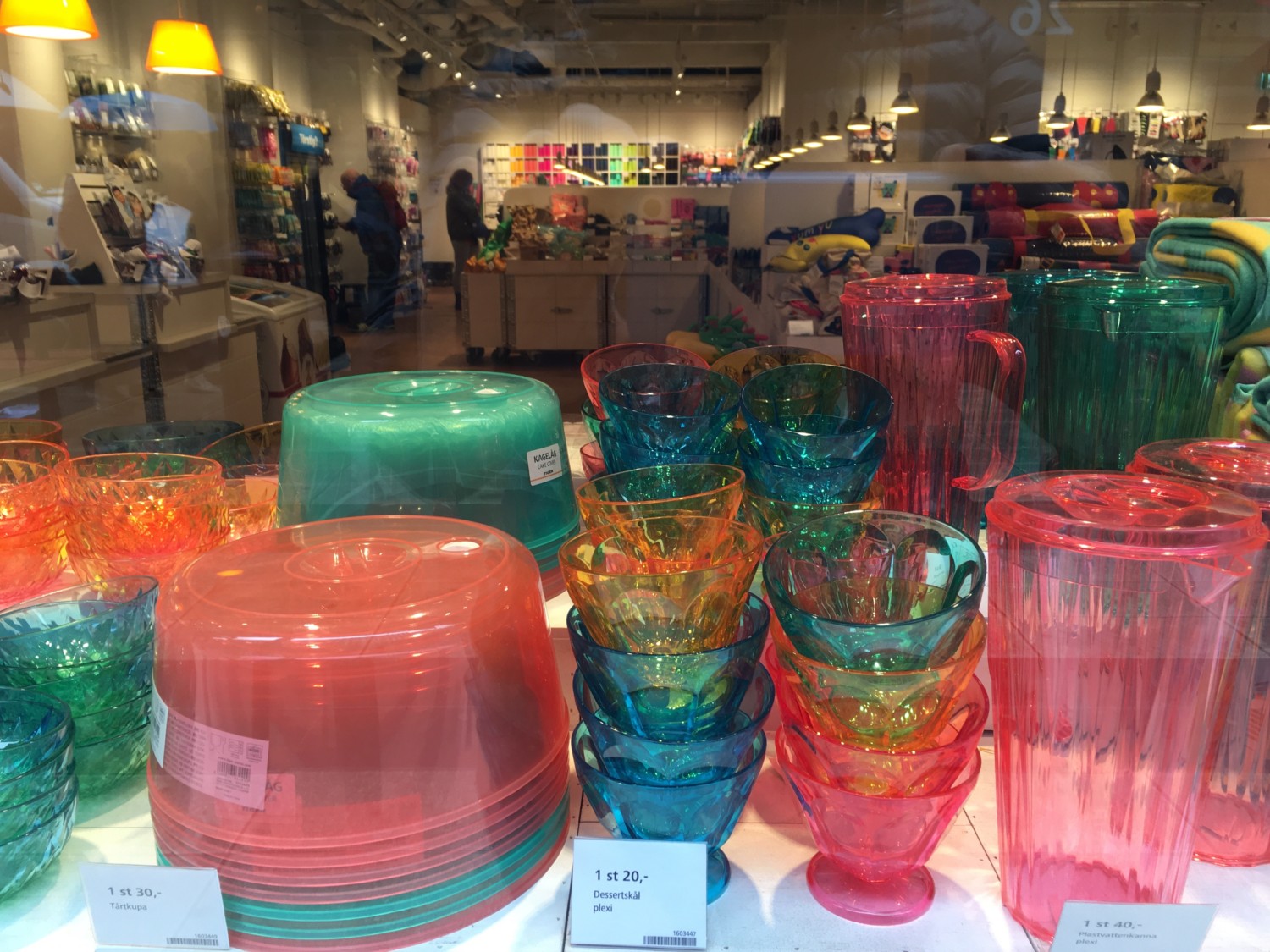Ecotoxicology is a research area in ascent. Since the beginning humans have survived by finding and making things in nature. Today we use thousands of chemicals that affords us new functionality. Unfortunately the chemicals also bring toxins into our every day lives. Tellus Think Tank contacts Åsa Arrhenius, doctor of Ecotoxicology, to learn more.
Text: Domi, Tellus Think Tank Photo: AnnVixen & Åsa Arrhenius
The Science of Ecotoxicology
There is a lot of research activity how chemicals affect our lives. Tellus Think Tank meets Åsa Arrhenius, PhD in

Ecotoxicology at Gothenburg University. She is also the coordinator of the newly established interdisciplinary “Center for future chemical risk analysis and management at the University of Gothenburg” ( FRAM).
Åsa Arrhenius says that humans are most sensitive to toxic chemicals when still in the womb or in adolescence, during periods of life when the body is growing and developing. As adults, the effect of chemicals is not quite as considerable. However, adults can transfer chemicals to children, for example during pregnancy.
Toxic substances in plastic toys
Åsa Arrhenius tells us that we now use hundreds of thousands of chemicals compared to just a hundred years ago. Some of these new chemicals are found in our homes. One example is Phthalates that are unhealthy and toxic. Phthalates can be found in, among other things, plastic toys.

According to the Swedish Nature Conservation Society (Naturskyddsföreningen), being overexposed to Phthalates can lead to severe deformities of children when still in the womb. Other risks are fetal death, decreased birth weight, undeveloped testicles, penises and livers leading to permanently damaged performance and tumours.
Fortunately Phthalates of some kinds are banned in the EU since 2015, but they are very likely still to be found in our homes. The Phthalates are used to soften plastics and rubber products, such as baby changing table covers, rubber ducks and plastic toys.
Toxic substances in textiles
Åsa Arrhenius says that even textiles may contain toxic substances. Toxic chemicals may have been added during manufacturing or added to protect the fabric. The functionality sought by use of these chemicals is certain types of colour pigments, flame-retardants, anti-mildew, water and dirt resistant effects.
According to the Swedish Chemicals Agency (Kemikalieinspektionen), textiles can contain toxins. They write about the carcinogenic Formaldehyde, Chromium compounds and Phthalates that also can cause allergies.
Åsa Arrhenius says that clothing with certain features such as antibacterial branded clothing and sweat repellent branded clothing and footwear can contain unhealthy toxic substances. She recommends avoiding these types of goods.
Plastic in our lives
We talk briefly about the admirable plastic ban that was introduced in Rwanda in 2008 (read article) .

This leads us to the small soft plastic bags, used daily, for example when buying fruit in the supermarket. These small bags often contain the chemical substance Bisphenol A. Bisphenol chemicals are used to soften plastic.
Studies show that Bisphenol A leads to reduced sperm quality and decreased sperm production. This is one important

reason for the EU banning Bisphenol A in baby bottles. Sweden has its own wider ban of Bisphenol A forbidding the chemical in food packages for children up to three years of age.
The Swedish Chemicals Agency has also proposed that Bisphenol A should be banned in the thermal paper that is used in receipts and tickets.
The Tellus Think Tank editorial team finds it extraordinary that Bisphenol A is allowed in food packaging at all. We would, as an example, prefer not to find Bisfenol A in the plastic coating on the inside of canned food.
EU and hazardous chemicals – a slow development in the right direction
EU controls much of the legislation and use of chemicals. Countries such as Sweden, Germany and Holland are driving forces in introducing stronger regulation on the use of chemicals. Sometimes they have to hold back their ambitions (on the pace) as the EU ‘s legislative work takes longer than wished for. It can be perceived that the EU is hindering efforts to strengthen legislation on toxic substances, however Åsa widens the perspective.
She reasons that chemicals cross country borders with the movement of people and goods but also with rain and wind. She means that a ban in one country therefore only has a limited effect. EU legislation may be cumbersome but when in place the impact across the EU is immediate. Eu legislation reaches way beyond the borders of Europe as imported goods from all corners of our planet have to follow the same legislation.
Regardless Åsa Arrhenius recommends to avoid buy plastic toys or plastic products from countries like China.
How I can reduce toxic substances in my own life

Åsa gives us solid advice on how to reduce the toxic chemicals in our everyday lives:
- When possible cut down on the use of chemicals and plastic in everything from food, clothing, detergents and medicine.
- Have a headache? Rather that routinely eat painkillers try and slow down for a while, take it easy and have a glass of water.
- Discard old plastic toys and send them to recycling instead of to the flea market.
- Replace plastic things in your home with more natural materials such as wood, glass and ceramics.
- Reduce your direct exposure to harmful chemicals in new textiles by washing before you use them. Unfortunately the chemical residues in waste water might end up in nature.
- When microwaving: Don’t use plastic containers, it is better to use glass bowls.
- When cooking: Avoid heating plastic utensils and bowls as the heating process can release toxic substances in them.
- Be an active consumer. Consumers have an enormous power – remove the plastic packaging in the supermarket and ask if the store might consider packing their food in other ways.
- Air your home regularly to rid it of deposited chemicals from plastic things, paint and furniture.
- If possible, use eco-labelled products and food such as the EU eco-label and others.
- Try to avoid detergents and cosmetics products that may contain plastic in micro formats.
Any hope on less toxic substances in our lives?
Åsa Arrhenius believes that general awareness on toxic chemicals is increasing. Stores around Sweden say that eco-labelled food and products are on demand. One area that FRAM, the centre that Åsa is coordinating, is looking into how to develop economic and legal instruments to bring about faster change. FRAM wants to help get legislation in place that encourages producers to replace harmful substances with more healthy ones.
On the whole, we still have a lot to learn on the effects of the thousands of substances that we are exposed to through different products such as detergents, medicines, plastics and food in our lives. Fortunately, there is progress in both research and legislation in the field of Ecotoxicology.
Read more about how a more sustainable future might look, here!
In Tellus Think Tanks next article we meet Madeleine who performed a “Plastic Diet” in her life and home. Get notified when the article is available!


Quick facts
Ecotoxicology is the study of the effects of toxic chemicals on biological organisms, especially in the population, community, ecosystem level. Ecotoxicology is a multidisciplinary field, which integrates toxicology and ecology
Åsa Arrhenius, PhD in Ecotoxicologi at the University of Gothenburg. Since 2016 Åsa is also the coordinator of the Center for Future chemical risk analysis and management at the University of Gothenburg”, FRAM.
The University of Gothenburgh, Sweden: 37 000 students, 6000 employees, 282 PhD graduates per year, 2000 research students, founded 125 years ago in 1891, 538 professors in 8 faculties: Natural Sciences, Humanities, Art, Social Sciences, Business Administration, Education, IT faculty, Sahlgrenska Academy (medical).
FRAM – Center for Future Chemical Risk Analysis and Management at the University of Gothenburg. The centre aims, among other things, to find safe limits for chemical contaminants to protect people and the environment and believes that the effect of chemical mixtures are more toxic than single chemicals on their own, something that we should focus on in order to get to a more sustainable use of chemicals.
